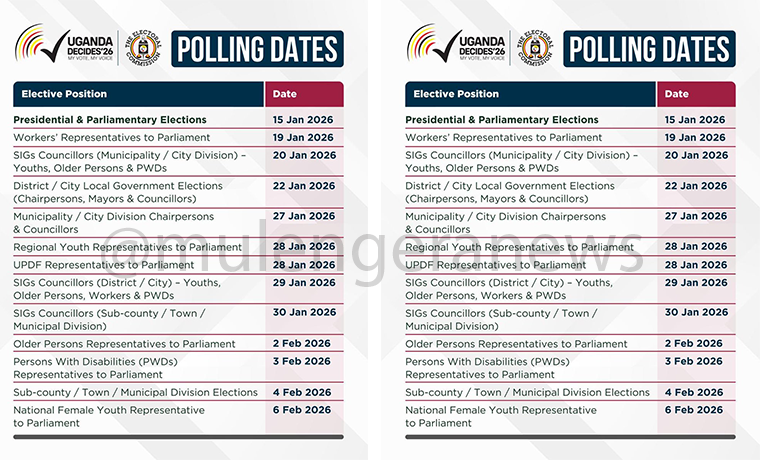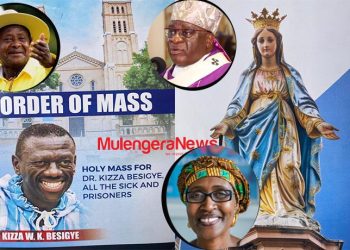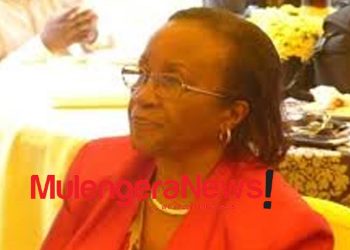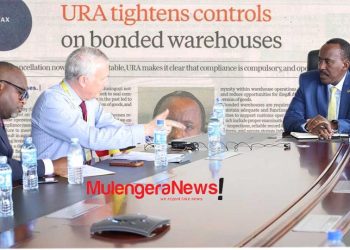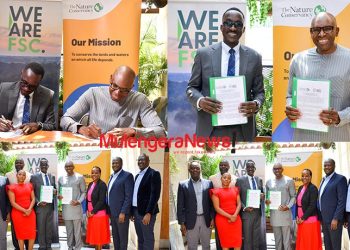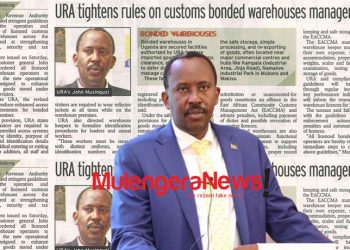By Mulengera Reporters
As part of the FY2019/2020 budget month, Ag PSST Patrick Ochailap appeared for a radio talk show with some of the leading economic pundits in town. The pundits (Ramadhan Goobi, Fred Muhumuza & Stephen Mukitale Birahwa) used the opportunity to point out inadequacies in the budgeting process.
They also gave their views on some of the recent administrative decisions the Finance Ministry has been making including transferring tuition fees collection mandate from the Universities to URA. A lecturer at MUBS, Goobi praised the move saying Universities hadn’t been adequately accountable and transparent with the monies collected yet staff associations have been pressurizing government to provide more resources. He said the only fear is that government might use URA to collect the tuition billions and not immediately pass it on.
Mukitale said there is no way anyone can trust the government that is increasingly living on short term borrowing & fixes to restrain itself from diverting the University cash to other things. The duo asked Ochaillap not to brag about the fact that the FY2019/20 budget hasn’t introduced many harsh taxes arguing it’s the fear to annoy the population on the eve of a major election that is causing President Museveni to appear to have less appetite to introduce new taxes.
Goobi said this is for political expedience and not because NRM is all of a sudden caring about people. “I’m only fearful Mr. PPST that the President might cause more disruptions by using ad hoc approaches to scrap more taxes like those in the markets and tax parks which will only create more problems for you guys at Finance,” Goobi said.
The Radio One talk show was hosted by Norah Owaraga who tasked Ochaillap to explain the logic behind the ever expanding budget size (to now Shs40trn from Shs32trn of last FY) yet citizens don’t see improvement in service delivery.
The panelists argued there is no way expansion in the budget can result into visible impact for citizens when local governments, which are at the center of service delivery upcountry, are only allocated Shs4.6trn off the Shs40trn budget. Ochailap said the LGs get much more by way of conditional grants which the center sends to them to boost service delivery.
Goobi also challenged growing expenditure on road sector and generally infrastructure development without the government requiring foreign firms (which take a lion’s share of the works budget) to invest in skills transfer. He also said it was anomalous for government to finance UNRA to only open new roads and expand the road network without proportionately funding road maintenance. “This is one area where Allen Kagina [UNRA ED] is bleeding quietly and it’s a price this country is going to pay,” Goobi said.


Mukitale, who comes from oil-rich Buliisa district, said government doesn’t seem prepared to adequately cash in on the money the oil companies will soon be spending on things like air travel expected to be very high in the next 3 years as they bring in relevant cargo. Mukitale said short term interventions such as recapitalizing UDC and increasing financial allocation to Uganda Air Cargo services under the Defense Ministry would enable government tap into frequent air travels oil & gas companies are going to be undertaking in the next three years as they ferry their cargo to the Hoima area.
Domestic flights should be intensified by Air Cargo, Mukitale suggested. He said in absence of a strong private sector (which he said is weak because of inadequate gov’t support), foreign firms are going to have a lion’s share and in the end repatriate all the money. He insisted government has to deliberately come in through UDC.
Dr. Fred Muhumuza, who was a Finance Ministry employee, recalled their days under PSST Kassami when LGs commonly duplicated past years’ work to dupe officials at the Finance Ministry to appear to have done a lot during the FY under review whereas not. He rejected promises that the PSST would consult more to understand why LGs aren’t impacting on service delivery as was originally expected. He said the problem of poor service delivery manifesting in bad roads, schools and hospitals is well known and consultation meetings cash should be put to more productive use as there is nothing for the PSST to consult anyone about.
The panelists were unanimous in putting it to Ochailap that the public debt would soon become unmanageable and suggested GoU scales down on borrowing. They also criticized the Shs8trn GoU is to borrow domestically in the FY2019/20 arguing it will keep interest rates up and cripple the private sector which can’t compete with government when it comes to borrowing from the domestic market. Ochaillap was also told it was unrealistic to set the URA collection target at Shs20trn when even the previous FY target wasn’t achieved.


Muhumuza also questioned the wisdom behind continued spending on establishment of Industrial Parks. He said it’s fallacious to insist on opening another 22 when even Namanve is still far from the ideal Industrial Park government desires to have in place. Muhumuza predicted these will soon become car parks as there is simply no market for industrial goods in Uganda for any investors to rely on to make decision to take up space in any of the Industrial Parks government is investing into.
The Makerere economist argued the problem of inadequate market (resulting from mass poverty) won’t be resolved soon because instead of tackling it head on, the Museveni government is busy erroneously prioritizing provision of electricity and good roads. “I’m afraid Mr. PSST that we have continued to get it wrong. Investors come to a country to put up industries because of the market and it’s never because you have plenty of electricity or good roads parse,” Muhumuza explained. “You have no market here because people are poor and can’t purchase. Overconcentration on industrialization isn’t going to drive the economy.”
WAY FORWARD
As a way forward, the panelists urged Ochailap to use his influence to ensure government scales down on consumptive expenditure. Goobi reflected on the Shs2.8trn in the FY2019/20 budget earmarked for special meals, vehicles, workshops/seminars, consultancies and parties to illustrate his case that some of the priorities are wrong because consumptive expenditure can’t lead to increased production. “If I was the Minister of Finance making decisions, I would invest that Shs2.8trn into agriculture or UDC,” said Goobi. He added if he was the President he would send the budget back to Parliament for some re-alignment. He said MPs distorted things a lot and reallocated cash from productive areas in favor of consumptive expenditures.
Goobi questioned MPs’ reduction of UDC budget by Shs2bn in favor of the Ethics & Integrity Ministry which to him isn’t a productive docket in anyway. He also characterized Shs4.2bn allocated for Africa Peer Review Mechanism (APRM) as wasteful unnecessary expenditure saying it doesn’t have any immediate benefit for Ugandans. He also queried the Shs5bn specifically allocated for public order management yet Uganda Police Force already has its own budget that should ideally cater for all its operational needs.
He too argued budget should be transformative as opposed to making economic growth the most important priority. “You can have growth like we have been having but which doesn’t lead to jobs being created,” Goobi argued.


He also questioned the wisdom behind continued agricultural interventions like inputs arguing time has come to adequately fund things like irrigation as opposed to sticking to interventions that haven’t worked. He also demanded for broadening of social protection interventions because there are many other socio-economically vulnerable groups beyond just the elderly. He referred to women, youth and PWDs as other categories requiring social protection interventions.
The panelists also called for rationalization of government demanding the immediate scrapping of some Ministries, Agencies and Departments of government. “Apart from your Ministry of Finance, and I’m not saying this because the PSST is here, the rest of the Ministries I don’t understand what their output is. When you go there, you don’t see work but at Finance you get the feeling guys are really doing work. We must reduce the size of Parliament and even cabinet. Can you imagine even photographers at cabinet functions have to struggle because the cabinet is too big and ministers can’t fit in one photograph,” Goobi said causing prolonged laughter in the studio. “We have too many cars with red and blue number plates which aren’t adding anything to production.”
For Mukitale the debate the Finance Ministry has ignited during the budget month is indicative “Uganda needs serious dialogue on many things beyond the politics being dialogued upon at IPOD.”
OCHAILLAP SPEAKS OUT
In his brief closing remarks, Ochaillap (who preferred listening to get as much feedback as possible) defended URA taking over fees collection on grounds revenues realized from passport issuance greatly increased once URA took charge. The similar result is expected at Universities, he said.
He said the FY2019/20 is aimed at setting pace for industrialization which will equally be prioritized in NDP III-and this is something the Finance Ministry isn’t apologetic about. He said emphasis is equally being put on expanding private sector participation. Ochaillap (who just two new contract recently) referred to the ACF scheme at BoU aimed at unlocking private sector agricultural investment into things like irrigation.
He also bragged about the ongoing recapitalization of UDC gradually enabling the doing of things MP Mukitale desires to see. He also highlighted GoU efforts to address climate change which he said “is clearly no longer a distant utopia.” He enumerated the 30 agri-irrigation schemes funded in the FY2019/20 budget and the related solar intervention to make sustainable irrigation affordable. As he left the microphone, Ochailap said he was excited participating in such a very vibrant debate and credit goes to Finance Ministry for its deliberate efforts to increase public debate around budgeting process. (For comments, call, text or whatsapp us at 0703164755 or email us at mulengera2040@gmail.com).

















